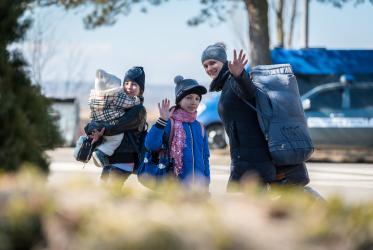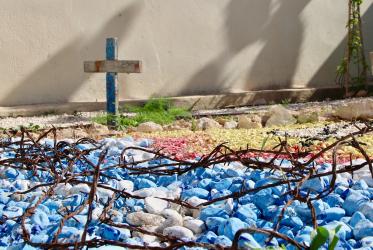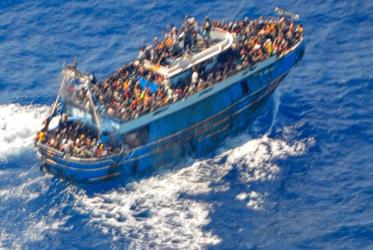By Susan Kim (*)
The world must address the plight of refugees streaming out of Syria and other countries, but we must also think beyond the current crisis, urged Doris Peschke, general secretary of the Churches' Commission for Migrants in Europe (CCME).
“We need to look at integration which is a two-way process,” she explained. “There does need to be a framework to enable people to make a safe passage and to overcome language barriers to become part of society. But it is at least as important to prepare that society, which fears change, to become welcoming and open.”
Both sides need to come together, she said. “We still see a lot of hesitation from people regarding refugees, and this is where we need to adopt a longer-term view.”
CCME cooperates with the World Council of Churches (WCC) and other ecumenical organizations in responding to the refugee crisis. CCME also has, for many years, worked to promote the vision of an inclusive community through advocating for an adequate policy for migrants, refugees and minority groups.
Seeing people as people
Refugees are human beings, not numbers or political representations, said Peschke, who has helped lead CCME’s “Safe Passage” campaign to connect local work in border monitoring with political advocacy for a humane asylum and migration policy.
“Safe Passage is so important, so that people are not driven into smuggling and criminal networks,” she said. “We cannot let people travel in life-threatening conditions. We cannot force them to climb fences, swim through difficult water, and risk family separation on the way to and through Europe.”
What is now seen as responding to a crisis has, in reality, been building up over a number of years, she added. “The refugee outflow from Syria to neighboring countries has been steadily going on because the situation in the country has further escalated, and life in refugee camps is not bearable.”
People simply want what every society wants for its children: the ability to survive and thrive. “People hope for a better situation in other countries. They want their children to attend good schools and make it further in their lives. This is very human and very normal.”
How to help
Those who want to take a first step toward helping refugees can talk to congregations or parishes in their own neighborhoods that are working with refugees. “Or, talk to an agency assisting refugees,” recommended Peschke.
Once people meet refugees, they begin to see how those coming into their country can become integral parts of society, she said. “I think every person can do something. People should not have to stay on the streets with no food, no water, no shelter. I have seen people working with churches and agencies helping refugees by staying with their children for the afternoon, listening to people who need to talk about their stories, or doing things together, even going to a concert or a sports match. These can become precious moments for both, newcomers and resident citizens.”
Soon, the label “refugee” begins to evaporate and people begin to connect on a basis of mutual respect, said Peschke. “The biggest help can be trying to accompany people as they reach a new sense of normalcy in their lives.”
(*) Susan Kim is a freelance writer from Laurel, Maryland, United States.
European churches encouraged to work together to address refugee crisis (WCC news release of 10 September 2015)
More information: Churches’ Commission for Migrants in Europe







